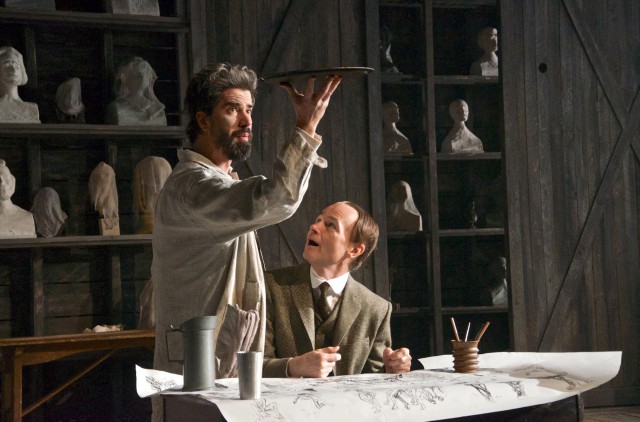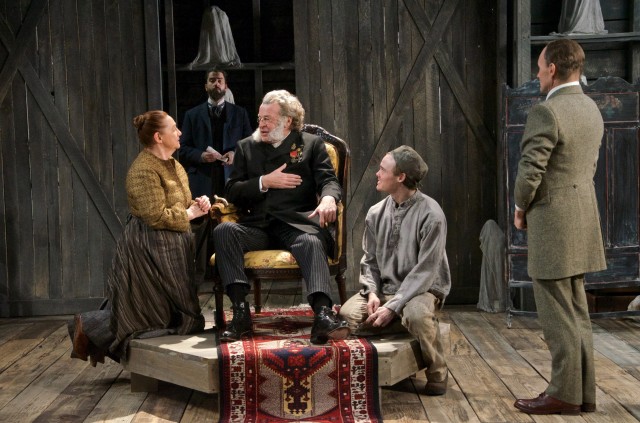
Artist Gustav Vigeland (Hamish Linklater) discusses his lofty goals with patron Sophus Larpent (Henry Stram) in POSTERITY (photo © Doug Hamilton)
Atlantic Theater Company
Linda Gross Theater
336 West 20th St. between Eighth & Ninth Aves.
Tuesday – Sunday through April 5, $20-$65
866-811-4111
atlantictheater.org
“I’m to entrust you to create a face that will outlive my own?” playwright Henrik Ibsen (John Noble) asks sculptor Gustav Vigeland (Hamish Linklater) in writer-director Doug Wright’s new play, Posterity. “Let you decide if I’m to be remembered as a genius or a madman, or both at once?” In Posterity, making its world premiere at the Atlantic Theater, Wright, who won a Tony for I Am My Own Wife and an Obie for Quills, examines legacy, fame, and artistic integrity as the young, ambitious Vigeland attempts to convince the old and frail Ibsen to sit for what will probably be his last portrait, a bust. At first Vigeland doesn’t want to do the commission, considering himself above mere standard portraiture — “I’m an artist,” he says. “An artist is a sculptor with an ego.” — but his prim and proper patron, Sophus Larpent (Henry Stram), tells him that if he doesn’t do it, his grand plan for a massive public fountain will never reach fruition. When Ibsen arrives, with cane and top hat, colorful medals on his fancy jacket, Vigeland’s young assistant and protégé, Anfinn Beck (Mickey Theis), and housekeeper, Greta Bergstrom (Dale Soules), flatter Norway’s most famous writer, but when Vigeland enters the studio, fireworks erupt as the two stubborn artists get involved in a battle of wits, arguing over the meaning of success, the importance of criticism, and the power of fame. Storming out, Ibsen collapses, leading to a second act that is repetitive and melodramatic, losing all of the momentum built up in the first act.

A mutton-chopped Henrik Ibsen (John Noble) considers sitting for an honorary bust in Doug Wright’s POSTERITY (photo © Doug Hamilton)
In 1901, Vigeland, who designed the Nobel Peace Prize medal, did indeed attempt to get Ibsen to sit for him. However, very little is known about the details of what happened inside Vigeland’s studio and Ibsen’s home, so most of Posterity is a creation of Wright’s, as are the characters of Beck and Mrs. Bergstrom, who were inspired by one of Vigeland’s sculptures. Shakespeare in the Park veteran Linklater (The Comedy of Errors, The School for Lies) is bold and audacious as Vigeland, his speech sharp and well defined, his movement stalwart and proud. Noble (Fringe, Sleepy Hollow) is an excellent foil, infusing Ibsen with a dark suspicion of others, more concerned about his legacy than he initially lets on. Derek McLane’s studio set features rows and rows of sculptures covered in white sheets, evoking Ibsen’s Ghosts. In the first act, Vigeland and Ibsen’s back-and-forth bantering about art teeters on the edge of pretentiousness but holds its ground, but in the second act it all falls apart like clay that’s too wet, as Wright adds several annoying plot twists and oversentimentality seeps in. No one really knows what happened when Vigeland and Ibsen met, what they said to each other; Wright has taken that situation and created a discourse on fame, ego, and longevity, but unfortunately Posterity is not one for the ages.